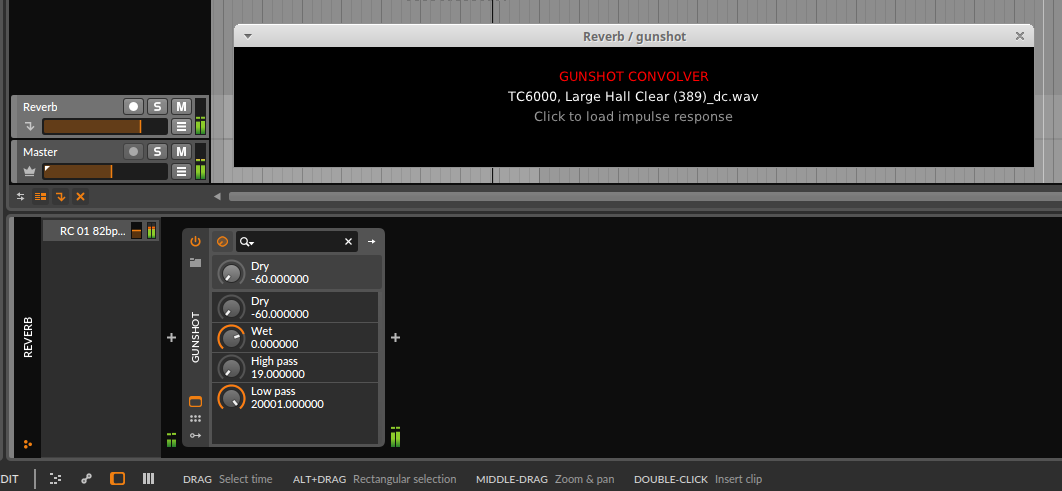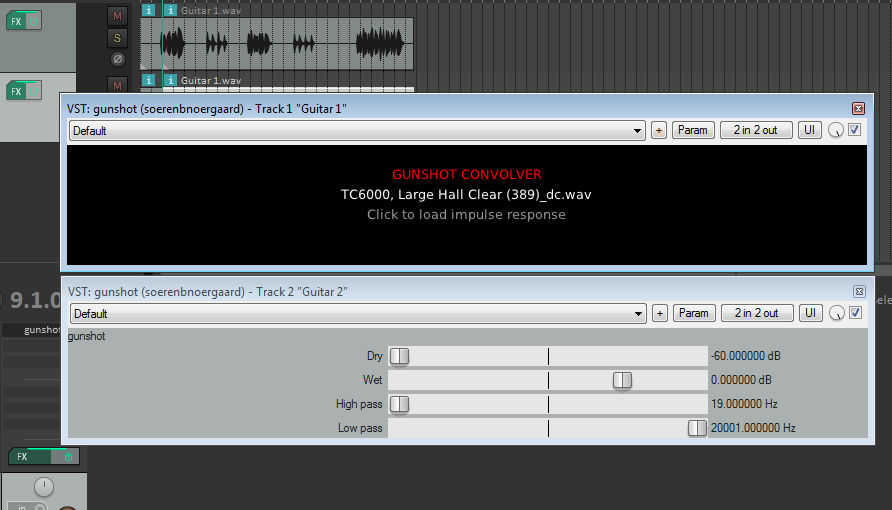Convolution VST plugin with low resource usage and minimalistic user interface. Useful for loading anything from reverbs to guitar cabinet impulse responses.
- Loads uncompressed WAV and AIFF files.
- Cross platform (Windows, OSX, and Linux).
- Impulse response is stored within the plugin state (not just a path to a file as this may move independently of the project).
- Automatic sample-rate conversion of the impulse response recording.
- Parameters: Wet level (dB), dry level (dB), high-pass filter (Hz), and low-pass filter (Hz).
- Minimalistic user interface. All control is done in the "Generic UI" of your DAW.
Bitwig on Linux:
Reaper on Windows:
My own contribution to this project is basically gluing together existing libraries. I have listed all the libraries below so you can check out the amazing work of these developers. Thanks a lot for your contributions to the open source community!
- KlangFalter - Convolution audio plugin (e.g. for usage as convolution reverb).
- DPF - DISTRHO Plugin Framework.
- FFTConvolver - Audio convolution algorithm in C++ for real time audio processing.
- AudioFile - A simple C++ library for reading and writing audio files.
- base64.c - Base64 Library in C
- DejaVu Fonts - The DejaVu fonts are a font family based on the Vera Fonts.
- libsamplerate - libsamplerate (also known as Secret Rabbit Code) is a library for performing sample rate conversion of audio data.
Releases of the plugin may be found in the Github release page.
After cloning the repository, check out the submodules too:
git submodule init
git submodule update
# To clean a repo already checked out
git clean -xfd
git submodule foreach --recursive git clean -xfd
git reset --hard
git submodule foreach --recursive git reset --hard
git submodule update --init --recursive
The steps needed to build the plugin are:
# Compiling for Linux
make -C dpf/dgl
make -C src/gunshot
# Cross compiling for Windows from Linux/Ubuntu
sudo apt install mingw-w64
make WIN32=true HAVE_CAIRO=false CC=x86_64-w64-mingw32-gcc CXX=x86_64-w64-mingw32-g++ LD=x86_64-w64-mingw32-ld -C dpf/dgl
make WIN32=true HAVE_CAIRO=false CC=x86_64-w64-mingw32-gcc CXX=x86_64-w64-mingw32-g++ LD=x86_64-w64-mingw32-ld -C src/gunshot
# Compiling on Mac OSX
brew install pkg-config
make -C dpf/dgl
make -C src/gunshot
Note of progress during development.
- Looking into modifying the KlangFalter instead of starting from scratch. KlangFalter is built using JUCE and I cannot get Projucer to build for linux.
- Found FFTConvolver which is the convolution library used in KlangFalter. It seems to be pure C++ and the test-program compiles just fine.
- Looking for a way to import WAV files.
- Figured out how to build DISTRHO's port of KlangFalter so I will try to modify this as it should build on all platforms.
- Could not work out how to modify KlangFalter - starting over instead.
- The state can now be extracted from the plugin when using Right Click - Save VST Preset. It is, however, not saved when storing a regular Bitwig preset. The Distrho States example exports the state in both cases (the Bitwig preset can be explored with
binwalk -> dd -> unzip). There must be some little difference between the two... - It seems like the state is only stored to a preset when the plugin has a UI - added a blank IO and now the preset looks good!
- I need a file browser. FLTK does not compile with
-fPICso it does not work well for shared objects. I am trying out some alternatives as FLTK is a bit hard to configure - nativefiledialog works very well! (only tested on linux but should work on the other platforms as well). - Linux: The file browser crashes Reaper, Ardour, and Mixbus5. It works ok in Bitwig and Waveform Free. I should probably consider another file browser option. It seems like there is one built into DPF! (gl-examples)
- The file browser now works well. Still missing: Parameters (wet, dry, low-pass, high-pass), sample rate conversion, and cross compilation.
- Cross compilation for Windows works somewhat. The GUI is fairly unstable and the font. The drawn GUI seems to stay shown after closing the window (the same seems to be true for the DPF example plugins). Maybe it is related to the cross compilation technique?
- The Dragonfly reverb also has the same artfacts (i.e. GUI not closing and fonts not showing) as I do - both when I compile it myself and when I download release 3.0. Maybe it is related to testing with VirtualBox? It may not handle OpenGL so well...
- Implemented sample rate conversion - this was very easy using libsamplerate! Sample rate conversion is done at run-time (and not when the sample is loaded) in order to adapt to changes in sample rate in a project.
- Cross compilation does work on a real Windows PC (not a VirtaulBox). The issue must have been related to the graphics drivers in VirtualBox. However, the plugin crashes Windows Tracktion T7, Mixbus, and Reaper when saving state. Maybe something is wrong with
getState()? - Fixed the bug where the plugin crashes in Windows DAWs. There was problem with dynamic array allocation in the
Stringclass ofdpf. I have created a fork with the changes and will send a pull request. - Looking at cross compiling using this Docker image: multiarch/crossbuild. There are some issues with the OpenGL libraries. However, I can compile on a Mac as well.
- In Linux Bitwig: Terminate process and reload with several instances of
gunshot, all plugins crash when re-activating the engine. Probably related to all the heavy calculations taking place in the real-time section (GunShot::run). This has been improved a lot by moving the hard work out ofrun(), but the plugin can still crash sometimes when loading a new impulse response during playback. Perhalps some work could be done in a separate thread? I believe this is fixed now as I have not seen it recently. - In Windows Reaper and Windows Mixbus, the plugin starts with no initial impulse response (not even a dirac). Maybe this is fixed now (there was a missing step in
initState()). This has been solved. - Added parameters for high-pass, low-pass, dry level, and wet level.
- KlangFalter has adoptive head and tail block sizes. The head the buffer size or the smallest factor of two larger than this. The tail block size is the largest of 8192 and two times the head block size. This has been implemented in GunShot too.
- The CPU usage is worse than Klangfalter. This is probably because KlangFalter does background processing of the tail section using the
TwoStageFFTConvolver. TheConvolverclass from KlangFalter has now been translated to DPF and the performance now looks to be the same. - On Windows,
AudioFilecannot load a file with unicode characters in the path (ø for example). It seems to work fine on Linux. Fixed by converting the path name from UTF-8 to ANSI/CP-1252 on Windows (at least, this works for the characters in the CP-1252 character set). It seems like it should be possible to use UTF-16 on Windows as well, but it seem to require Microsoft's C compiler and not GNU GCC.

